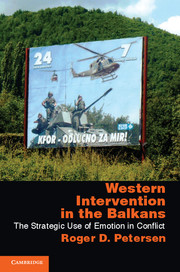Book contents
- Frontmatter
- Contents
- Acknowledgments
- Part 1 Background and Theory
- 1 Western Intervention in the Balkans
- 2 Emotions as Resources
- 3 The Strategic Use of Emotions, I
- 4 Intervention Games
- 5 The Strategic Use of Emotions, II
- 6 The Strategic Use of Emotions, III
- Part 2 Cases and Tests
- Appendix A A Note on Names
- Appendix B Alternative Arguments
- References
- Index
- References
2 - Emotions as Resources
from Part 1 - Background and Theory
Published online by Cambridge University Press: 05 June 2012
- Frontmatter
- Contents
- Acknowledgments
- Part 1 Background and Theory
- 1 Western Intervention in the Balkans
- 2 Emotions as Resources
- 3 The Strategic Use of Emotions, I
- 4 Intervention Games
- 5 The Strategic Use of Emotions, II
- 6 The Strategic Use of Emotions, III
- Part 2 Cases and Tests
- Appendix A A Note on Names
- Appendix B Alternative Arguments
- References
- Index
- References
Summary
Protracted conflict, especially when it is violent, produces powerful experiences, often connected to forces such as stigma and prejudice, the human tendency to think in terms of group hierarchy, and natural reactions to violence, victimization, and humiliation. Emotions are the residues of such experiences.
Variation in the success and failure of interventions is often related to the way that actors use, or ignore, these emotions. Western interventions are usually based on a straightforward application of “sticks and carrots.” Intervention is a matter of organizing a “game,” usually an iterated prisoners’ dilemma (discussed in more detail later), in which players are bribed and/or constrained to make desired choices. But not everyone wishes to play the game as it is set out. Emotions become a very powerful resource that can be used to change the actors or the rules. Like weapons and money, emotions can be a strategic tool.
Before the use of emotions is discussed, it is necessary to define what they are and how they work. This chapter proceeds in two sections.
The first section defines emotions and their effects more generally. Although the theory of emotion underlying this book builds on fundamental concepts from the field of psychology, these concepts need modification to address the phenomena most central to political conflict. This section explains those modifications.
- Type
- Chapter
- Information
- Western Intervention in the BalkansThe Strategic Use of Emotion in Conflict, pp. 23 - 51Publisher: Cambridge University PressPrint publication year: 2011



